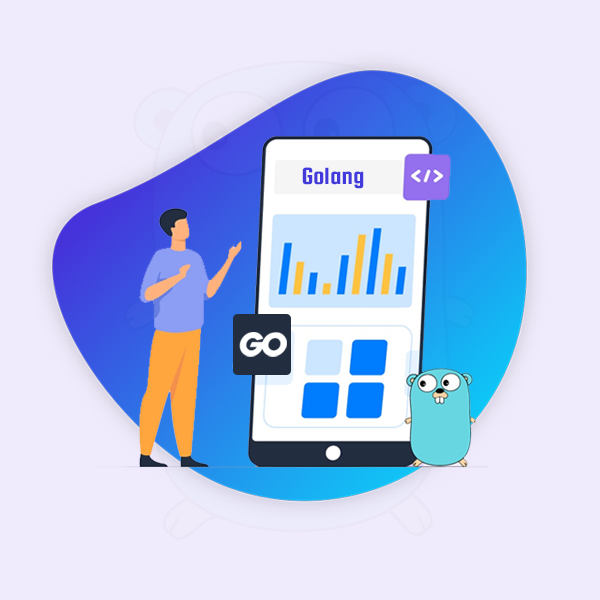Golang Web Development Everything You Need To Know-Connect Infosoft

Visit Our Service: https://www.connectinfosoft.com/golang-development-service/
Every year, new languages, frameworks, and libraries are introduced to increase programming efficiency and practice in the web development area. Google's Golang is one such language that improves on current languages such as Python, C, and others. As a result, Golang web development has become a popular choice for many new projects!
If you're thinking about hiring a GO programmer for your next Golang web development project, keep reading to learn what makes this language different, among the best Golang Frameworks, the language's benefits and cons and much more.
What is Golang?
Golang, also known as Go, is a programming language developed by Google. It was designed to be efficient, reliable and easy to use. The language was created by a team of engineers at Google, including Robert Griesemer, Rob Pike and Ken Thompson and was officially announced in 2009.
Go was developed in response to the need for a programming language that could address certain challenges faced by Google's software engineers, such as slow compilation times, complex dependencies and the difficulty of writing concurrent programs. It was also designed to be a good fit for modern computer architectures and networked environments.
Go is a statically typed language with a syntax similar to C, but it includes modern features such as garbage collection, memory safety, structural typing and built-in support for concurrent programming. It offers a simple and concise syntax, making it easy to read and write code. Go also emphasizes simplicity, readability and maintainability, with a focus on reducing complexity and providing a streamlined development experience.
Top Go Web Frameworks
There are several popular web frameworks available for building web applications in Go. Here are some of the top Go web frameworks:
Gin:
Gin is a lightweight and fast web framework for Go. It provides a minimalistic and flexible API for building web applications. Gin offers features like routing, middleware support, JSON validation and rendering. It is known for its high performance and low memory footprint.
Echo:
Echo is another lightweight and high-performance web framework for Go. It is designed to be simple, fast and scalable. Echo provides features such as routing, middleware support, template rendering and WebSocket support. It has a clean and intuitive API for building web applications quickly.
Revel:
Revel is a full-featured web framework for Go that follows the Model-View-Controller (MVC) architectural pattern. It provides a comprehensive set of features, including routing, request handling, template rendering, database integration and more. Revel aims to make it easy for developers to build robust and scalable web applications.
Fiber:
Fiber is a fast and flexible web framework for Go inspired by Express.js. It focuses on performance and provides an easy-to-use API for building web applications. Fiber offers features like routing, middleware support, template rendering and WebSocket support. It is known for its low memory allocation and high concurrency.
Buffalo:
Buffalo is a batteries-included web development eco-system for Go. It aims to streamline the development process by providing a set of integrated tools and conventions. Buffalo includes features like routing, middleware support, database integration, asset pipeline and more. It also includes a code generator for scaffolding application components.
Beego:
Beego is a full-featured MVC web framework for Go. It follows the Model-View-Controller (MVC) architectural pattern and provides features like routing, request handling, session management, database integration and more. Beego aims to provide a scalable and modular framework for building web applications.
What Kind of Go Web Applications Can You Build With Go?
With Go, you can build a wide range of web applications, ranging from simple to complex, including:
Microservices:
Go's lightweight footprint and efficient concurrency make it an ideal language for building microservices architectures. You can create independent services that communicate with each other using protocols like HTTP or gRPC. Go's standard library and frameworks provide the necessary tools for building and managing microservices.
Web Applications:
Go can be used to build web applications of various sizes and complexities. Whether it's a simple blog, a content management system (CMS), a social media platform, or an e-commerce site, Go provides the necessary libraries and frameworks to handle routing, request handling, template rendering, database integration and more. Frameworks like Revel, Beego, or Buffalo are suitable for building full-featured web applications.
Backend Services:
Go can be used to build backend services for web applications, mobile apps, or other systems. These services often handle tasks such as authentication, data processing, file uploads, database operations and integration with external services. Go's performance, simplicity and extensive standard library make it well-suited for these purposes.
DevOps Tools:
Go is widely used for building command-line tools and utilities, making it an excellent choice for building DevOps tools. Whether it's a deployment script, a monitoring tool, a log analyzer, or a continuous integration/continuous deployment (CI/CD) tool, Go's simplicity and cross-platform support make it a popular choice in the DevOps space.
Features of Golang Web Development
When it comes to web development with Go (Golang), there are several features and advantages that make it a compelling choice. Here are some key features of Golang web development:
Concurrency:
Go has built-in support for concurrency through goroutines and channels. Goroutines are lightweight threads that allow for concurrent execution, making it easier to handle multiple requests and perform tasks concurrently. This concurrency model enables efficient utilization of resources and can greatly improve the performance and scalability of web applications.
Efficiency And Performance:
Go is designed to be a highly efficient and performant language. It compiles to machine code, resulting in fast execution times. Go's garbage collector is optimized for low-latency, which helps reduce the impact on application performance. Additionally, Go's minimalistic and statically typed syntax contributes to faster compilation and execution.
Standard Library:
Go comes with a comprehensive standard library that provides a wide range of functionality needed for web development. It includes packages for handling HTTP requests, routing, template rendering, encryption, database connectivity and more. The standard library is well-documented and follows consistent conventions, which makes it easy to learn and use.
Error Handling:
Go emphasizes explicit error handling. It uses a simple and explicit error return value convention, which encourages developers to handle errors directly within their code. This approach promotes robust error handling and helps in writing more reliable and resilient web applications.
Testing Support:
Go has strong support for testing built into its standard library. The testing package provides tools and utilities for writing unit tests, benchmark tests and integration tests. Go's testing framework makes it easy to write comprehensive tests for web applications, ensuring code quality and facilitating the adoption of test-driven development (TDD) practices.
Cross-Platform Suppor:
Go is a cross-platform language, allowing web applications to be developed and deployed on various operating systems, including Windows, macOS, Linux and more. This cross-platform support enables developers to build applications that can run seamlessly across different environments.
Scalability:
Go's concurrency model and efficient resource utilization make it well-suited for building scalable web applications. With goroutines and channels, developers can handle a large number of concurrent requests and efficiently utilize system resources. This scalability is particularly valuable in high-traffic or real-time applications.
Advantages of Golang for Web Development:
- Concurrency: Go provides built-in support for concurrency through goroutines and channels. This makes it easier to handle multiple requests and perform tasks concurrently, leading to improved performance and scalability.
- Efficiency: Go is designed to be a highly efficient language. It compiles to machine code, resulting in fast execution times. Go's garbage collector is optimized for low-latency, minimizing pauses and improving overall application performance.
- Simplicity: Go has a simple and concise syntax, which makes the language easy to read and write. It has a small set of keywords and a minimalistic approach, reducing complexity and making code maintenance and collaboration more straightforward.
- Scalability: With its lightweight goroutines and efficient concurrency handling, Go is well-suited for building scalable web applications. It can handle a large number of concurrent requests efficiently, making it suitable for high-traffic scenarios.
Disadvantages of Golang for Web Development:
-
Learning Curve: Although Go has a relatively simple syntax, it may still have a learning curve for developers who are not familiar with the language. Learning Go's idiomatic patterns and best practices, as well as understanding the nuances of concurrent programming, may require some time and effort.
-
Less Developer Community: Compared to more established languages, Go may have a smaller developer community. While the community is growing rapidly, finding extensive resources, tutorials, or community support for specific issues may be more challenging.
-
Limited Framework Choice: Although there are several popular web frameworks available for Go, the options may be relatively limited compared to languages like Python or JavaScript. However, the existing frameworks like Gin, Echo and others do provide a solid foundation for building web applications.
TAGS: Golang Web Development, Looking for Golang Development Service Company in India, Looking for web development company, Looking for Dev Team in India, Custom Web App Development, ERP, CRM, Customer Relation Management Service, Bots / AI Development Services, Custom Plugin/Integration Service
